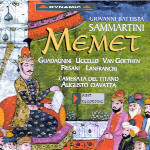Here are the problems of Turkish Emperor Maometto II a.k.a. Memet (tenor): He loves the Byzantine slave girl, Irene (soprano) despite its political incorrectness; she is in love with Demetrio (male alto)–then again, so is her sister, Zaide (soprano), who in turn is loved by Solimano (soprano, probably a castrato at the 1732 premiere). Irene refuses to love Memet so he resolves to have her and Demetrio executed. Solimano and Zaide plead with him to show his princely virtues and pardon them. He does, and everyone looks forward to the next pillaging campaign he’ll go on.
This takes two hours and 40 minutes: there are about 20 arias, 25 minutes of secco recitative, a few accompanied recitatives, a duet (for Demetrio and Irene), a trio, and a 90-second quintet finale in which they all hope for war and ruin. The tensions therefore, are clearly in the individual arias, wherein we get to know the characters’ temperaments: Irene is noble and warm; Memet is a warrior capable of passion, as is Demetrio; Zaide is by turns desperate and resigned; and Solimano is reasonable but tough. There are some vocal acrobatics required for each character, and the martial arias, with trumpets and drums accompanying, are very effective. In the end, this opera plays more like a collection of arias composed solely to depict the players’ emotions, which is certainly far worthier on disc than it would be on stage.
The cast sounds young and not altogether polished. While each singer gets through his or her music without embarrassment (and often better), there isn’t a voice among them that you would race to hear. However, Daniela Uccello, as Irene, displays nice warmth, and Mirko Guadagnini gets through Memet’s difficult music with élan if not luscious tone. Maestro Ciavatta and his Camerata present the score with energy but without convincing us that we’ve unearthed a masterpiece. This is clearly for specialists, who will be mildly rewarded.
































